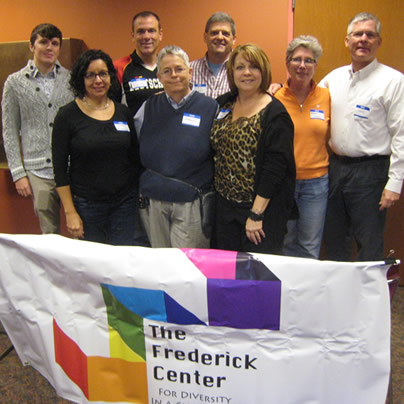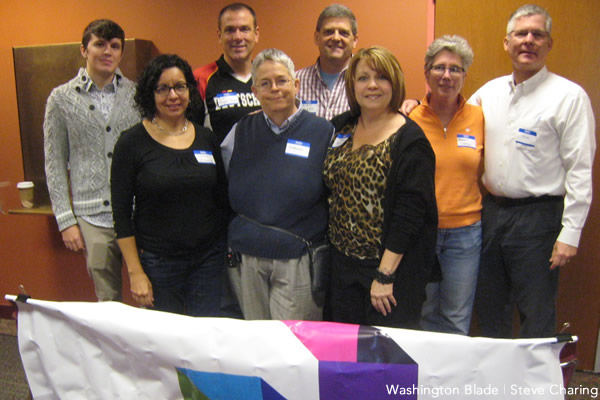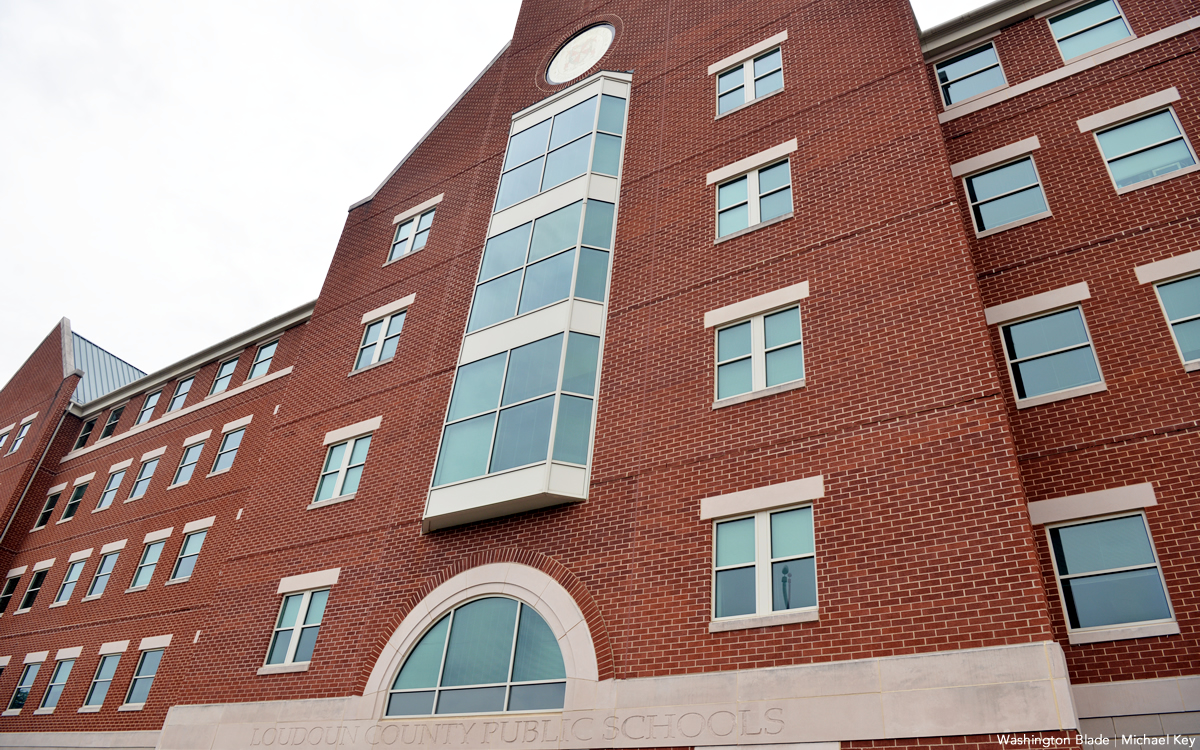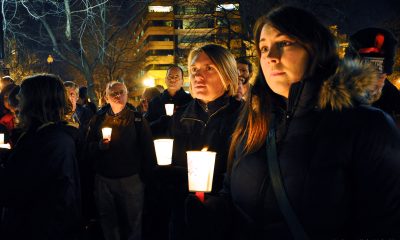Local
At the center of LGBTQ Frederick
Group celebrates 2nd anniversary helping youth, others


The Frederick Center’s leaders, from left: executive director Austin Beach; board members Diane Iñiguez, Rev. Dr. Robert Apgar-Taylor, Katherine Jones, Brian Walker, Cindie Beach, Maureen Conners and Peter Brehm. (Blade photo by Steve Charing)
There was a flurry of activity at the public library on E. Patrick Street in the heart of the historic district in Frederick, Md. on a recent Saturday morning. Inside, several people were lugging pamphlets, name tags, business cards, beverages and pastries into the library’s community room while others were setting up tables and chairs and preparing a Power Point presentation.
Outside the building on this cool October morning, you could peer through the famous spires of Frederick and see the autumn colors on Maryland’s mountains in the west. The foliage may as well have been rainbow colors, as the folks performing these tasks inside were getting ready for the second annual general meeting of the LGBTQ Frederick Center or simply The Frederick Center (TFC).
Fifteen years ago, the idea of a gay center in Frederick would have been considered unimaginable. Alex X. Mooney, a virulently anti-gay conservative Republican from Frederick was elected to the state Senate in 1998 using, in part, a message warning voters of the “homosexual agenda.” He once said, “Homosexual activists have managed to gain legal recognition as a minority, based solely on their lifestyle choices, through so-called ‘hate crimes’ and domestic partnership laws.”
Employing divisive rhetoric like that, Mooney was elected two more times, reaffirming Frederick’s conservative leanings, but with decreasing margins each time. But Mooney was finally unseated in 2010 by pro-LGBT former Frederick Mayor Ron Young.
Frederick County, an exurb of Washington D.C. and Baltimore—roughly equidistant to both—has seen a growth in population of around 25 percent since 2000. Much of this increase is attributed to an influx of young married white-collar workers and professionals or singles moving into new housing developments. Indeed, the median age in the county is seven years younger than the rest of the state.
With the arrival of younger, more educated residents, a less conservative tilt exists, but the political landscape has not shifted to the point where it is like Montgomery County or Baltimore City. Brian Walker, president of the TFC board, said while there has been progress inside Frederick especially due to the increasing number of affirming churches, “the attitude toward LGBT folks outside of Frederick has been spotty.”
But a pro-LGBTQ mindset appears to be on the rise here. Although in 2012, Mitt Romney defeated President Obama by a 50-47 percent margin in Frederick County, voters affirmed Question 6 on same-sex marriage by 2,400 votes or 51-49 percent.
The Frederick Center emerged because its founder realized something was missing.
“I felt there was a need for an LGBTQ center in Frederick because of my experience,” says Austin Beach, 21, who is also the executive director of TFC. “As a young man discovering my identity I had no resources that where easily available to me and I felt firsthand how that affected me. I didn’t want anyone else to go through that same process of feeling there was no one there to help them.” In January 2012, TFC was born.
Cindie Beach heads up TFC’s youth group, where “over the past two years, there had been a total of 70 youth and of those, seven were at one time homeless.” She said she also performed four suicide interventions. “To succeed, the youth must have a roof over their heads and food in their mouths,” she said. “We need emergency housing and long-term housing for these kids and a support system in place. Some get thrown out for being LGBT and appear at my door. It breaks my heart.”
TFC does not have a permanent home as of yet. It holds events in Frederick’s affirming churches and other pro-LGBTQ business establishments. But that could change.
“I envision the center being a focal point of support, resources, and education for Marylanders LGBTQ community both inside, but especially outside of the D.C. and Baltimore areas,” says Austin. “I hope to soon see us having our own space, offering transitional services, counseling, shelter space, etc. to the LGBTQ community and if all goes well, being on the forefront of LGBTQ advocacy in Maryland in the ever-growing area of Frederick”
For more information about The Frederick Center, visit thefrederickcenter.org.
Virginia
DOJ seeks to join lawsuit against Loudoun County over trans student in locker room
Three male high school students suspended after complaining about classmate

The Justice Department has asked to join a federal lawsuit against Loudoun County Public Schools over the way it handled the case of three male high school students who complained about a transgender student in a boys’ locker room.
The Washington Blade earlier this year reported Loudoun County public schools suspended the three boys and launched a Title IX investigation into whether they sexually harassed the student after they said they felt uncomfortable with their classmate in the locker room at Stone Bridge High School in Ashburn.
The parents of two of the boys filed a lawsuit against Loudoun County public schools in U.S. District Court for the Eastern District of Virginia in Alexandria. The Richmond-based Founding Freedoms Law Center and America First Legal, which White House deputy chief of staff Stephen Miller co-founded, represent them.
The Justice Department in a Dec. 8 press release announced that “it filed legal action against the Loudoun County (Va.) School Board (Loudoun County) for its denial of equal protection based on religion.”
“The suit alleges that Loudoun County applied Policy 8040, which requires students and faculty to accept and promote gender ideology, to two Christian, male students in violation of the Equal Protection Clause of the 14th Amendment to the U.S. Constitution,” reads the press release.
Assistant Attorney General Harmeet K. Dhillon of the Justice Department’s Civil Rights Division in the press release said “students do not shed their First Amendment rights at the schoolhouse gate.”
“Loudoun County’s decision to advance and promote gender ideology tramples on the rights of religious students who cannot embrace ideas that deny biological reality,” said Dhillon.
Outgoing Virginia Gov. Glenn Youngkin and outgoing Virginia Attorney General Jason Miyares in May announced an investigation into the case.
The Virginia Department of Education in 2023 announced the new guidelines for trans and nonbinary students for which Youngkin asked. Equality Virginia and other advocacy groups claim they, among other things, forcibly out trans and nonbinary students.
The U.S. Department of Education’s Office of Civil Rights in February launched an investigation into whether Loudoun County and four other Northern Virginia school districts’ policies in support of trans and nonbinary students violate Title IX and President Donald Trump’s executive order that prohibits federally funded educational institutions from promoting “gender ideology.”
District of Columbia
Capital Pride announces change in date for 2026 D.C. Pride parade and festival
Events related to U.S. 250th anniversary and Trump birthday cited as reasons for change

The Capital Pride Alliance, the D.C. based group that organizes the city’s annual LGBTQ Pride events, has announced it is changing the dates for the 2026 Capital Pride Parade and Festival from the second weekend in June to the third weekend.
“For over a decade, Capital Pride has taken place during the second weekend in June, but in 2026, we are shifting our dates in response to the city’s capacity due to major events and preparations for the 250th anniversary of the United States,” according to a Dec. 9 statement released by Capital Pride Alliance.
The statement says the parade will take place on Saturday, June 20, 2026, with the festival and related concert taking place on June 21.
“This change ensures our community can gather safely and without unnecessary barriers,” the statement says. “By moving the celebration, we are protecting our space and preserving Pride as a powerful act of visibility, solidarity, and resistance,” it says.
Ryan Bos, the Capital Pride Alliance CEO and President, told the Washington Blade the change in dates came after the group conferred with D.C. government officials regarding plans for a number of events in the city on the second weekend in June. Among them, he noted, is a planned White House celebration of President Donald Trump’s 80th birthday and other events related to the U.S. 250th anniversary, which are expected to take place from early June through Independence Day on July 4.
The White House has announced plans for a large June 14, 2026 celebration on the White House south lawn of Trump’s 80th birthday that will include a large-scale Ultimate Fighting Championship (UFC) event involving boxing and wrestling competition.
Bos said the Capital Pride Parade will take place along the same route it has in the past number of years, starting at 14th and T Streets, N.W. and traveling along 14th Street to Pennsylvania Ave., where it will end. He said the festival set for the following day will also take place at its usual location on Pennsylvania Avenue, N.W., between 2nd Street near the U.S. Capitol, to around 7th Street, N.W.
“Our Pride events thrive because of the passion and support of the community,” Capital Pride Board Chair Anna Jinkerson said in the statement. “In 2026, your involvement is more important than ever,” she said.
District of Columbia
Three women elected leaders of Capital Pride Alliance board
Restructured body includes chair rather than president as top leader

The Capital Pride Alliance, the D.C.-based group that organizes the city’s annual LGBTQ Pride events, announced it has restructured its board of directors and elected for the first time three women to serve as leaders of the board’s Executive Committee.
“Congratulations to our newly elected Executive Officers, making history as Capital Pride Alliance’s first all-women Board leadership,” the group said in a statement.
“As we head into 2026 with a bold new leadership structure, we’re proud to welcome Anna Jinkerson as Board Chair, Kim Baker as Board Treasurer, and Taylor Lianne Chandler as Board Secretary,” the statement says.
In a separate statement released on Nov. 20, Capital Pride Alliance says the restructured Board now includes the top leadership posts of Chair, Treasurer, and Secretary, replacing the previous structure of President and Vice President as the top board leaders.
It says an additional update to the leadership structure includes a change in title for longtime Capital Pride official Ryan Bos from executive director to chief executive officer and president.
According to the statement, June Crenshaw, who served as acting deputy director during the time the group organized WorldPride 2025 in D.C., will now continue in that role as permanent deputy director.
The statement provides background information on the three newly elected women Board leaders.
• Anna Jinkerson (chair), who joined the Capital Pride Alliance board in 2022, previously served as the group’s vice president for operations and acting president. “A seasoned non-profit executive, she currently serves as Assistant to the President and CEO and Chief of Staff at Living Cities, a national member collaborative of leading philanthropic foundations and financial institutions committed to closing income and wealth gaps in the United States and building an economy that works for everyone.”
• Kim Baker (treasurer) is a “biracial Filipino American and queer leader,” a “retired, disabled U.S. Army veteran with more than 20 years of service and extensive experience in finance, security, and risk management.” She has served on the Capital Pride Board since 2018, “bringing a proven track record of steady, principled leadership and unwavering dedication to the LGBTQ+ community.”
• Taylor Lianne Chandler (Secretary) is a former sign language interpreter and crisis management consultant. She “takes office as the first intersex and trans-identifying member of the Executive Committee.” She joined the Capital Pride Board in 2019 and previously served as executive producer from 2016 to 2018.
Bos told the Washington Blade in a Dec. 2 interview that the Capital Pride board currently has 12 members, and is in the process of interviewing additional potential board members.
“In January we will be announcing in another likely press release the full board,” Bos said. “We are finishing the interview process of new board members this month,” he said. “And they will take office to join the board in January.”
Bos said the organization’s rules set a cap of 25 total board members, but the board, which elects its members, has not yet decided how many additional members it will select and a full 25-member board is not required.
The Nov. 20 Capital Pride statement says the new board executive members will succeed the organization’s previous leadership team, which included Ashley Smith, who served as president for eight years before he resigned earlier this year; Anthony Musa, who served for seven years as vice president of board engagement; Natalie Thompson, who served eight years on the executive committee; and Vince Micone, who served for eight years as vice president of operations.
“I am grateful for the leadership, dedication, and commitment shown by our former executive officers — Ashley, Natalie, Anthony, and Vince — who have been instrumental in CPA’s growth and the exceptional success of WorldPride 2025,” Bos said in the statement.
“I look forward to collaborating with Anna in her new role, as well as Kim and Taylor in theirs, as we take on the important work ahead, prepare for Capital Pride 2026, and expand our platform and voice through Pride365,” Bos said.




















